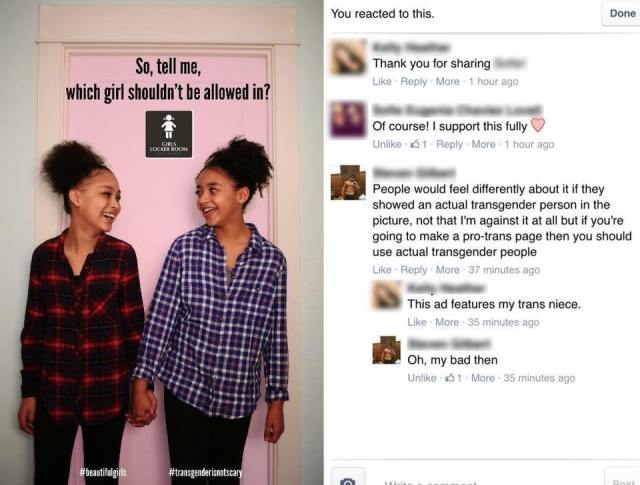Ladies, we’ve all been there, queuing for the loo with that growing sense of dread – did I remember to put my birth certificate in my handbag? As we all know, access to women’s facilities is subject to approval from the gender police, and the terror when you approach the attendant with the explanation that you used a different bag this morning, you don’t know how it happened, but the little wallet with your birth certificate didn’t get transferred, but here’s my driving licence and, look, it’s suitably gendered – all the time hoping that your bladder doesn’t give out before being granted access to the cubicle.
Utter rubbish, of course. Possession of a birth certificate stating you are female doesn’t grant or prevent you access to the ladies loos. Lest my male-identifying readers suddenly think, “wey hey”, there are public order offences galore. If you act in a predatory manner or in an intimidating manner, you can be hauled up before the beak and I guarantee that your legal sex won’t be able to form any part of your defence. Any plea of “your honour, I’m allowed to perve on the ladies in the ladies because I’ve got a female birth certificate” will be laughed out of court.
Why write this, when the law in this area has been fairly rigid for quite a long time? Well, today is Trans Day of Visibility, and the Guardian saw fit to mark this annual occasion by publishing a piece by Hadley Freeman who, amongst other things, wrote that if the Gender Recognition Act was changed to allow trans people to self-declare their gender “a lot of women have argued that predatory men could now come into female-only spaces unchallenged.”
Let’s unpick this a little more. The sole purpose of the Gender Recognition Act is to change the sex recorded on someone’s birth certificate. In 2015, the Womens and Equalities Select Committee heard evidence that the GRA is being applied in an obstructive manner, that trans people were put off applying because of (a) cost and (b) a feeling that the process itself was dehumanising (you submit paperwork to a panel who you never meet, and you have no right of appeal against their decision). Evidence also referenced a growing list of other countries who have moved to a self declaration model without problems, and also noted that UK passports and driving licences are, essentially, issued using a self-declaration model. Just think – when was the last time your passport or driving licence was not accepted as primary identification?
A group of transphobic women have made a lot of noise about self-declaration meaning men can come into women’s spaces. Hot news – well, not so hot, actually, as it’s at least 8 years old – it’s the Equality Act 2010 which governs that, and government seems to be supremely resistant to making changes to that law (which may cause issues for non-binary people, but that’s a different thread). Changing the GRA makes absolutely no difference to whether someone “has undergone, is undergoing or is proposing to undergo” a process of gender reassignment (to quote the words used in the Equality Act).
Despite the repeated answers, still the British media give space to this flawed argument – that self-declaration of gender has something to do with access to toilets or changing rooms. It doesn’t. It really doesn’t. Trans women without gender recognition (and without surgery) have been using these facilities without issue for decades. Men have been prosecuted under public order offences for abusing these facilities for decades. If the problem is men’s behaviour – then address men’s behaviour. Don’t penalise trans women for it.
The other key trope is that trans people are automatically identifiable. This was demonstrated beautifully by the social media graphic below.

By trying to make access to women’s facilities dependent upon some gendered documentation obtained by quasi-legal process, not only are these transphobic women trying to roll back existing case and statute law; they’re also trying to institute policing of gender by appearance, and will fail. Already women are reporting an increased incidence of being challenged about using gender-appropriate facilities because they’re either a bit muscly, wearing Doc Martens or have short hair. Is this really feminism?
Also, by insisting on trans people using the facilities of their birth gender, that means that trans men would be forced to use the ladies. I can’t even begin to process the complexities of how to police that in any meaningful way. How would you effectively distinguish between a trans man and any other man? Surely that would open the floodgates on men pushing to get access to women’s spaces? The whole “penises belong in men’s toilets” starts to break down, as forcing trans men to use women’s facilities means that they would have to bring their penises with them.
And, yes, to those non-binary readers, I know this is an argument answered in a very binary way. In part that’s because the way the argument is posed is essentially binary. And I know the non-binary way, the out-of-the-box way, to answer this question is to ask why have gendered facilities in the first place – and I have a lot of sympathy with de-gendering spaces where appropriate.
Time was when newspaper opinion writers used to have to base their thoughts on facts. Now we seem to be treating uninformed and inaccurate opinion as equally valid to facts and expertise. It can be argued that Brexit and opposition to climate change are examples of this. Don’t let gender recognition be a third casualty.

Reblogged this on oopster74.